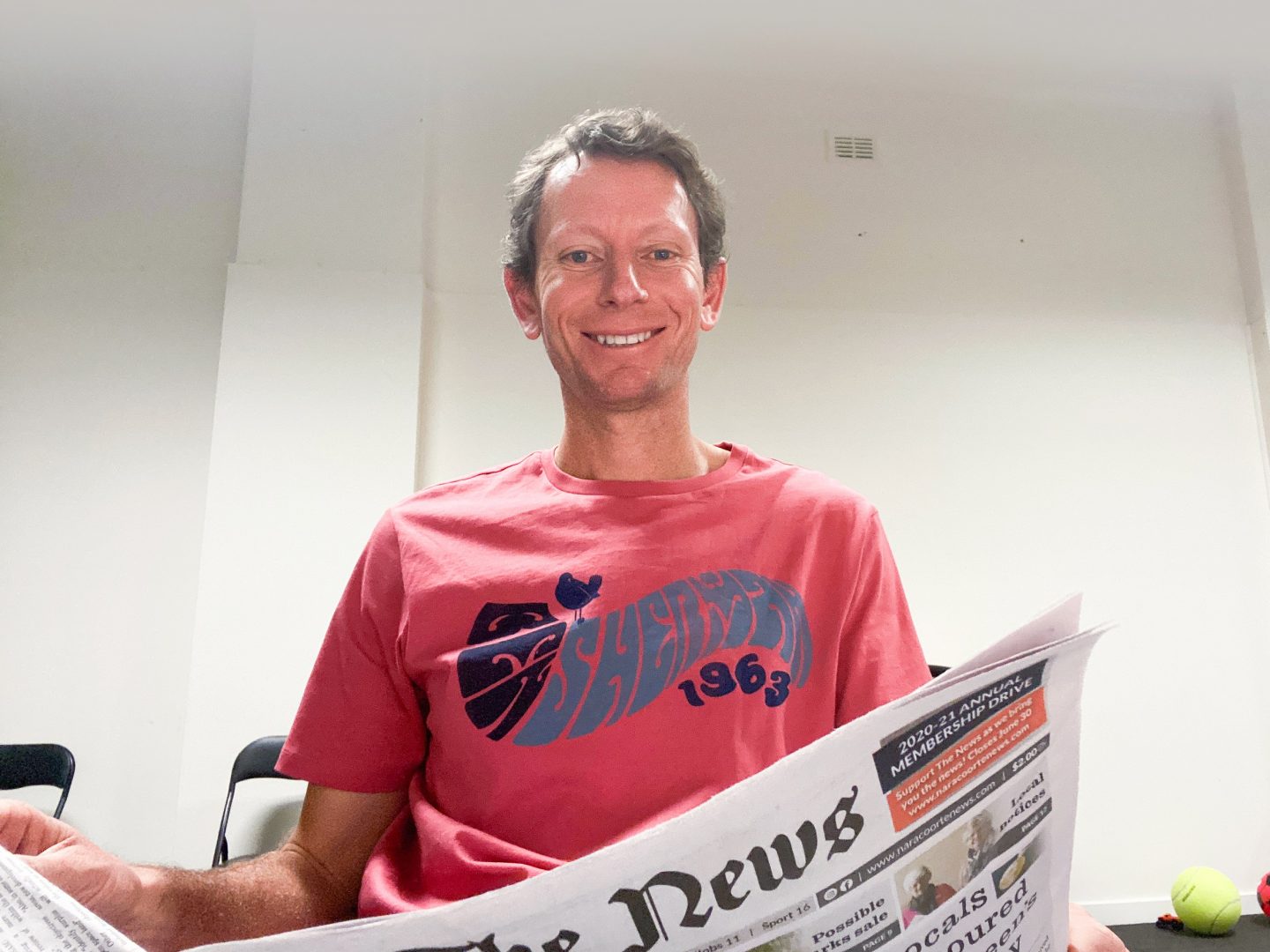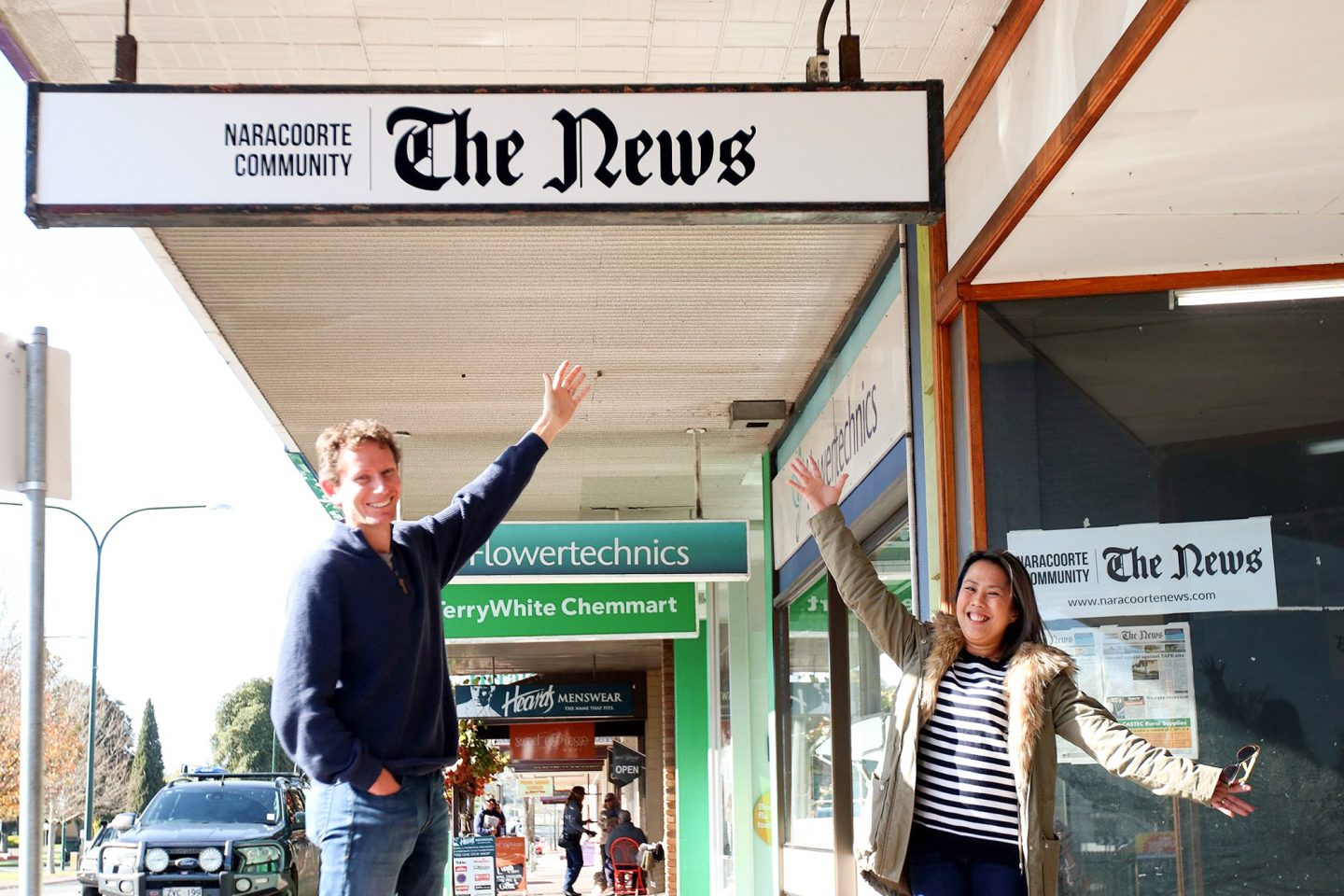Michael Waite had been working as a financier in Seattle for several US companies including one owned by Bill Gates. He was travelling with his family when he learned his mother was sick and returned to Naracoorte to be by her side while she received treatment. As her treatment ended, COVID-19 hit and Waite and his family weren’t going anywhere.
Waite’s arrival coincided with the suspension of the 145-yearold Naracoorte Herald, along with numerous other regional papers across Australia. His mother worked for the Herald for 35 years and Waite was keenly aware of the importance of a town’s local paper to the community. He asked a family friend and former editor of the Herald if there was something he could do to help.
“I thought that maybe I could be a strategic adviser for someone that could start a local newspaper. Helping to build businesses is what I like doing,” says Waite.
He didn’t plan on providing the service himself but in the end it was Waite that ended up making it all happen. Having no experience in running a newspaper didn’t deter him. He had plenty of energy and experience with start-ups, and with long hours and the help of one and a half journalists, he’s done it. At the time of writing, the Naracoorte News is five weeks old, four editions down and is breaking even already. The town is abuzz with excitement about their new paper.
 Michael Waite
Michael Waite
Asked about the community reception, local real estate agent Sarah Ottoson- Crossling says: “Do you know what I love seeing? I love seeing everyone sitting in their cars lined up in the main street on a Wednesday morning, all with their newspapers open. They can’t wait to read it.
“I haven’t seen that for a long time, even when the Herald was still here. We were great supporters of the Herald but it was losing its connection to the community as there were next to no staff towards the end. When a paper isn’t owned and run by a local you lose that local voice,” she says.
But not everyone is excited. Some council members have expressed discontent with how council activity is being reported. However, Naracoorte and Lucindale councillor Cameron Grundy says that nothing has been reported that wasn’t said or didn’t happen.
Sue Hood, a retired Naracoorte resident, believes it is because these members have not been used to journalists attending council meetings. “Some people are uncomfortable with the light being shone on them. But a good council has nothing to fear,” says Hood.
“Do you know what I love seeing? I love seeing everyone sitting in their cars lined up in the main street on a Wednesday morning, all with their newspapers open.”
According to Hood, reporting on council meetings allows readers to understand the process of local government and decide whether or not the council, which is supposed to be representing them, is doing just that. “It starts a conversation and it certainly has started a conversation in the town again. People really like the fact the paper is there,” she says.
Grundy agrees.
“Ultimately we as councillors have to […] represent what we stand for and sometimes that will be palatable with some people and not with others but that just comes with public office. It’s that simple.”
Naracoorte and Lucindale’s mayor, Erika Vickery OAM knows how much value the community places on a good local paper. She hopes that the Naracoorte News reports on the issues that come through council in a neutral way without editorial comment.
“Negativity doesn’t help the community. The way a story is written can either divide or bring the community together. We need the good news stories to share among our community, particularly during a pandemic, and the newspaper has that ability to do that.” At the same time, she agrees that fair communication should include covering council’s challenges as well as its achievements.
Darren Robinson, the president of Country Press SA and sales manager at Barossa-based The Leader newspaper, owned by his family, knows that sometimes the relationship between local government or business interests and the local newspaper can be vexed. His paper has always enjoyed a good relationship with their council, but they have occasionally experienced threats from big business to withdraw their advertising if they disagree with something that has been reported.
“It’s a balancing act. Generally, people recognise the paper’s role and they respect that, and if good reporting comes at a price of loss of advertising so be it.”
 Waite and head of sales Veb Johnson
Waite and head of sales Veb Johnson
As for local government, Robinson believes it is in their best interests to have a local paper covering what they do. “The amount of work that the paper can do on a council’s behalf as an independent third party is critical, so I think more than ever, heading into the future, people are going to recognise that.”
Ben Taylor, managing director of the Taylor Group of Companies, which includes the Gawler Bunyip and the Murray Pioneer, agrees that the relationship between local government and local paper can sometimes be difficult to manage. “It’s a double-edged sword, but a smart council will use the local newspaper to its advantage as well, and then the negatives are forgotten,” says Taylor.
“It’s a double-edged sword, but a smart council will use the local newspaper to its advantage as well, and then the negatives are forgotten.”
There have been challenges but, for Waite, getting to know his old hometown again in such an immersive way has been an amazing experience. He feels like he has compressed 10 years of reassimilating into six weeks.
“I’m so grateful for that. It just warms my heart. The number of people that have called out ‘Way to go, Michael’ has been incredible, I have been given so much support.”
And for those few that are less eager about his newspaper? “This is a democracy, and good honest news is the staple of democracy.”
Waite is optimistic that, as the Naracoorte News becomes a constant presence, there will be greater acceptance of its role by all parts of the community. With a readership that has gone from 1650 in the last years of the Naracoorte Herald to 2500 for the Naracoorte News in just five weeks, that constant presence seems to be assured.
Sarah Hender is an award-winning freelance writer based in Adelaide. She writes features for both local and national publications. Sarah formerly practised as a lawyer for more than 20 years.
Get the latest from The Adelaide Review in your inbox
Get the latest from The Adelaide Review in your inbox